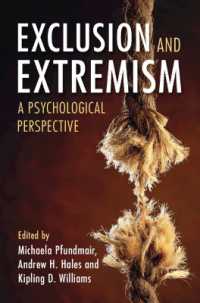- ホーム
- > 洋書
- > ドイツ書
- > Mathematics, Sciences & Technology
- > Mathematics
- > probability calculus, stochastics, mathematical statistics
Full Description
mso-fareast-language: EN-US;">This book provides an overview of agent-based modeling (ABM) and multi-agent systems (MAS), emphasizing their significance in understanding complex economic systems, with a special focus on the emerging properties of heterogeneous agents that cannot be deduced from the characteristics of individual agents.








